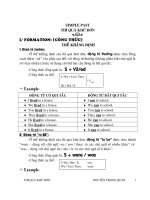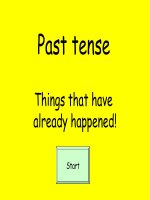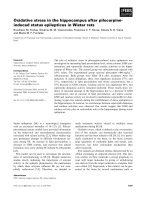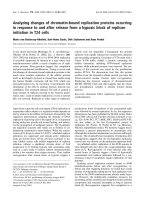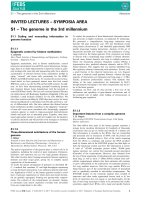Revision Activate B1unit 78
Bạn đang xem bản rút gọn của tài liệu. Xem và tải ngay bản đầy đủ của tài liệu tại đây (205.46 KB, 10 trang )
<span class='text_page_counter'>(1)</span>Test Units 7 and 8 VOCABULARY equip (v) /ɪˈkwɪp/ trang bị. Independent +of : độc lập khỏi. Be equipped with: được trang bị. PHRASAL VERBS get into (phr.v) 1 [PHRASAL VERB] V P n. Equipment (n) trang thiết bị Research (v) /rɪˈsɜːtʃ/ nghiên cứu Artificial (adj) /ˌɑː.tɪˈfɪʃ.əl/ nhân tạo Challenge (n) /ˈtʃæl.ɪndʒ/ thử thách Essential (adj) /ɪˈsen.tʃəl/ cơ bản, thiết yếu. If you get into a particular kind of work or activity, you manage to become involved in it. He was eager to get into politics. 2 [PHRASAL VERB] V P n If you get into a school, college, or university, you are accepted there as a student. I was working hard to get into Cambridge.. Look for (phr.v) tìm kiếm. ə. Urgent (adj) /ˈɜː.dʒ nt/ khẩn cấpurgency(n) Expensive # inexpensive Sensor (n) /ˈsent.səʳ/ thiết bị cảm ứng Detect(v) /dɪˈtekt/ phát hiện, khám phá , dò Recognize (v) /ˈrek.əg.naɪz/ nhận ra Fall over (v) té xuống đất, ngã Replace (v) /rɪˈpleɪs/ thay thế replacement (N). Sit around (phr. v) ngồi lại với nhau mà k làm gì Wake up (phr. v)tỉnh dậy đi! Break down (phr. v) hư hỏng (máy móc), sụp đổ (người) Break up (phr.v) chia tay (mối quan hệ), nghỉ (lớp học) Cut off (phr.v) cắt ngắn đi. Aggressive (adj) /əˈgres.ɪv/ hung hăng. Fall apart (phr.v) hết làm việc hiệu quả (tổ chức, xí nghiệp), đau khổ (chia tay). Aggression (n) /əˈgreʃ.ən/ sự hung hăng, sự hung dữ. Speak up (phr.v) nói to lên. Universe (n) /ˈjuː.nɪ.vɜːs/ vũ trụ. Switch off (phr.v) tắt. Fortunate# unfortunate (adj) may thay# k may thay. Swicth on (phr.v) mở. Dull (adj) /dʌl/=boring: nhàm chán. Turn up/down (phr.v) giảm/ tăng (âm). Depend +on (v) phụ thuộc, trông cậy vào. Set up=establish=found: thành lập. Dependent (adj) có tính phụ thuộc. Work out (phr.v) =develop. – Writing Write your answer in about 100 words on your answersheet. • This is part of a letter you receive from an English penfriend. In your next letter, please tell me about what you like doing in your free time. Do you stay at home or do you like going out? • Now write a letter, telling your penfriend what you like doing ………………………………………………………………………………………………………………………… ………………………………………………………………………………………………………………………… ………………………………………………………………………………………………………………………….
<span class='text_page_counter'>(2)</span> ………………………………………………………………………………………………………………………… ………………………………………………………………………………………………………………………… ………………………………………………………………………………………………………………………… ………………………………………………………………………………………………………………………… ………………………………………………………………………………………………………………………… ………………………………………………………………………………………………………………………… ………………………………………………………………………………………………………………………… ………………………………………………………………………………………………………………………… ………………………………………………………………………………………………………………………… ………………………………………………………………………………………………………………………… ………………………………………………………………………………………………………………………… Exam 5: Test Units 9 and 10Write your answer in about 100 words on your answersheet. • Your English teacher has asked you to write a story. • Your story must have this title: A New Friend • Write your story on your answer sheet. ………………………………………………………………………………………………………………………… ………………………………………………………………………………………………………………………… ………………………………………………………………………………………………………………………… ………………………………………………………………………………………………………………………… ………………………………………………………………………………………………………………………… ………………………………………………………………………………………………………………………… ………………………………………………………………………………………………………………………… ………………………………………………………………………………………………………………………… ………………………………………………………………………………………………………………………… ………………………………………………………………………………………………………………………… ………………………………………………………………………………………………………………………… ………………………………………………………………………………………………………………………… ………………………………………………………………………………………………………………………… ………………………………………………………………………………………………………………………… Exam 6: Test Units 11 and 12 This is part of a letter you receive from an English penfriend. You told me in your last letter that you sometimes stay with your cousins in the summer. What kind of place do they live in? Can you tell me about it? • Now write a letter, answering your penfriend’s questions. ………………………………………………………………………………………………………………………… ………………………………………………………………………………………………………………………… ………………………………………………………………………………………………………………………… ………………………………………………………………………………………………………………………… ………………………………………………………………………………………………………………………… ………………………………………………………………………………………………………………………… ………………………………………………………………………………………………………………………… ………………………………………………………………………………………………………………………… ………………………………………………………………………………………………………………………… ………………………………………………………………………………………………………………………….
<span class='text_page_counter'>(3)</span> ………………………………………………………………………………………………………………………… ………………………………………………………………………………………………………………………… ………………………………………………………………………………………………………………………… ………………………………………………………………………………………………………………………… GRAMMAR. I.. Tag Questions. The basic structure is: statement. question tag. + Positive statement,. negative tag?. Snow is white,. isn't it?. Negative statement,. + positive tag?. You don't like me,. do you?. I. Make Tag questions for the following sentences: 1. Harry takes sugar in tea, __________? 2. The lift isn't working today, __________? 3. It never works very well, __________? 4. Everybody realized the danger, __________? 5. There was a lot of noise here, __________? 6. Nobody complained about the noise, __________? 7. Mary hardly ever cooks, __________? 8. We had to wait for a long time to get our visa, _________? 9. They don't allow pet dogs in this shop, __________? 10. Nothing went wrong with him, __________? 11. He never takes advice, __________? 12. There used to be trees here, __________? 13. I am too impatient, __________? 14. Dick wouldn't tell anyone about this story, __________? 15. Let's go out tonight, __________? 16. Sue doesn't know John, __________? 17. There is an exam tomorrow, __________? 18. We've seen that movie before, __________? 19. He'd never met her before, __________? 20. You don't really love her, __________? 21. This will work well, __________? 22. I couldn't help it, __________? 23. You'll tell me if she calls, __________? 24. We'd never have known, __________? 25. The weather's bad today, __________? 26. She won't be late tomorrow, __________?.
<span class='text_page_counter'>(4)</span> 27. Nobody knows the answer, __________? 28. The moon goes round the earth, __________? 29. Elephants live in Europe, __________? 30. He's still sleeping at the moment, __________? II. Multiple Choice 1. He couldn’t swim, ______? A. could him B. could he C. couldn’t he 2. Nobody cheated in the exam, ______? A. did they B. didn’t they C. did he 3. You have seen this film, ______? A. haven’t you B. have you C. do you 4. His name is Messi, ______? A. isn’t he B. is he C. is it 5. Let’s have a drink, ______? A. don’t we B. do we C. shall we 6. He can speak three languages, ______? A. can he B. can’t he C. isn’t he 7. I think she is a good teacher, ______? A. don’t I B. do I C. is she 8. You went on a picnic last week, ______? A. didn’t you B. didn’t I C. did you 9. Teresa is an accountant,___? A. aren't she B. doesn't she C. isn't she 10. I am a good worker,___? A. I am B. do I C. amn't I 11. Peirre is a grandfather,___? A. he isn't B. isn't he C. he is 12. Kate is a doctor, ___? A. she is B. is she C. doesn't she 13. Jacques and Alicia are students, ___? A. aren't they B. are they C. isn't he 14. Mario is at work right now, ___? A. aren't they B. isn't he C. is he 15. You and I are busy right now, ___? A. aren't I B. aren't we C. we aren't 16. It's windy today, ___? A. am I B. aren't they C. isn't it 17. You wanted that, ______? A. would you B. didn't you C. wouldn't you 18. He saw that, ______? A. is he B. won't he C. didn't he 19. You know that's right, ______? A. would you B. wouldn't you C. don't you 20. He wil be coming, ______? A. is he B. did he C. doesn't he 21. After all this time you'd think he'd have forgotten, ______? A. didn't you B. wouldn't you C. don't you. D. couldn’t him D. didn’t he D. don’t you D. isn’t it D. shan’t we D. is he D. isn’t she D. does he D. she isn't D. aren't I D. doesn't he D. isn't she D. isn't they D. isn't she D. aren't you D. isn't he D. do you D. doesn't he D. didn't you D. won't he D. do you.
<span class='text_page_counter'>(5)</span> 22. The amount he is suffering from hay fever he needs to see a doctor, ______? A. doesn't he B. did he C. won't he 23. You may think you know the answer but you don't, ______? A. don't you B. would you C. wouldn't you 24. After working so hard he didn't deserve to fail the exam, ______? A. doesn't he B. did he C. won't he 25. You wouldn't report me, ______? A. don't you B. would you C. wouldn't you 26. He isn't going to like this, ______? A. didn't he B. did he C. won't he 27. Sabine was an actress, ___? A. was she? B. didn't she C. wasn't she 28. I was very tired, ___? A. did I B. weren't I C. was I 29. Alexander was a factory owner, ___? A. he wasn't B. wasn't he C. he was 30. Monica was here, ___? A. she was B. wasn't she C. didn't she. D. is he D. do you D. is he D. do you D. is he D. she wasn't D. wasn't I D. didn't he D. was she. II. Past perfect Past Perfect Tense được dùng để diễn tả: 1. Một hành động xảy ra trước một thời điểm xác định trong quá khứ. EX: John had traveled to England before 2000. 2. Một hành động xảy ra trước một hành động khác trong quá khứ. S1 + Past Perfect + before + S2 + Simple Past EX: George had seen this movie before he went to bed last night. S1 + Simple Past + after + S2 + Past Perfect EX: George went to bed after he had seen this movie last night.. S1 + Past Perfect + when + S2 + Simple Past EX: When I came back home yesterday, my friend had already been there. Fill in the blanks with the correct forms of verbs in the brackets. 1. They went home after they (finish) …………………. their work. 2. She said that she (already, see) …………………. …. Dr. Rice. 3. When we came to the stadium, the match (already, begin) ………………….. 4. They told me they (not, eat) …………………. such kind of food before. 5. He asked why we (come) …………………. so early. 6. After they (go) …………………., I sat down and rested. 7. Before she watched TV, she (do) …………………. her homework. 8. It was the first time I (ever, see) …………………. such a beautiful girl. 9. We (move) …………………. To BMT City by 1990. 10. By the time we got there, the play (start) …………………. already. 11. Before going to bed, the man (turn) …………………. off all the lights. 12. A stranger (wait) ………………….for him when he came back home yesterday. Past Perfect and Past simple 1. We (see) ……………………..... that film before 1975..
<span class='text_page_counter'>(6)</span> 2. When I (come) ………... to the room last night, this film (begin) ……………………..... a quarter before. 3. …….…. Ronald Regan (be)………….......a Hollywood actor before he (become) .......a politician? 4. I (feel) ………………….......... little better after I (take) ………………….......... the medicine. 5. Was Tom at the party when you (arrive) …………..........? – No, he (go) …………….......... home. 6. Anna (never, see) …………………...........snow until last winter. 7. He (live) ………………….......... in his father’s house till his father died. 8. What did you do after you (leave) ………………….......... the stadium? 9. In the 1980 Olympic Games, the Soviet people (complete) ……………............. their preparations when the participants (arrive) …………………............. 10. When he (come) .............., the children (already, finish) ..................................the exercises. 11. By the time he (arrive) …………………., the match (begin) ...................... 12. When the telephone rang, I (just, finish) …………........................... my homework. 13. Peter’s father (repair) ………………….......... his old bicycle this morning. 14. When we (come) .......................... Tom (have) ………......dinner already 15. After she (finish) .....................her work, she (leave) ........................the office. 16. As soon as it (stop) ........................raining, the workers went on with their work. 17. What ……… he (do) …… after he (leave) ......................... school? 18. Before I (come) ........here yesterday, my mother (call) ……………………. me. 19. We were very tired last night because we (play) …........football in the afternoon. 20. Linda wasn’t at home then, maybe she (go) …………………… out. 21. I (meet) ............................. him twice before I (leave) ............................. for London. 22. When we (come) ............................. to the movies, the film (already, begin) ............................. 23. After I (finish) ............................. my breakfast, I (get) ............................. ready to go to school. 24. By 2007, I (leave) ............................. high school. 25. He (leave) ............................. his office after he (read) ............................. the report. 26. He (go) ..................... to the railway station yesterday morning but the the train (start) ............................. 27. The manager (already, leave) ............................ for the conference before we (get) ….......to the office. 28. This worker (not, finish) ............................. his work before he (go) ............................. home. 29. I didn’t meet Sleve because when I (arrive) ..................., he (go) .......................to school..
<span class='text_page_counter'>(7)</span> 30. ................... you (live) ............... in Hanoi before you (move) ............................. to here? 31. I (go) ............................. to bed before 9 p.m last night. 32. Miss Snow (type) ............................. ten letters before lunchtime yesterday. 33. The train (start) ............................. before we (arrive) ............................. at the station. 34. The film (begin) ............................. when we (get) ............................. to the cinema. 35. He said that he (see) ............................. that man before. 36. Mr. Brown (die) ..... ................................after he (be) ............................. ill for a long time. 37. By December 1st last year, he (work) ............................. in the bank for 5 years. 38. He discovered that he (eat) ............................. a fly. 39. He (do) ............................. nothing before he (see) ….......me. 40. I realised that I (see) ............................. that woman before. 41. Where ………… you (go) ……………. yesterday? – I (go) .......................... to see one of my friends. 42. Peter (have) ............................. dinner before he (do) ………………. his homework. 43. These students (take) ............................. an exam before they (have) ............................. a summer holiday last year. 44. They got up late, and when they (arrive) .............at the staion, the train (leave) ……………....... 45. After getting up, the boy (brush)......................... his teeth and (have) ............................. breakfast. 46. When I (get) ........home, she (be) ........there for three hours. 47. We tried to phone Henry this afternoon, but there (be) ........no answer. He (go) ........out. 48. They arrived at work in the morning and found that somebody (break) ...................into the office during the night. So they (call) ................the police. 49. He (not, lock) ............................. the door before going to work this morning. 50. Lisa (meet) ……......Brian a few weeks ago. He (just, come) ......................back from holiday.. III. Can, could, be able to Note: + We use can to say that something is possible or that somebody has the ability to do something. We can see the lake from our bedroom window. Can you speak any foreign languages? I can come and see you tomorrow if you like. + The negative is can't (= cannot): I'm afraid I can't come to the party on Friday. + Be able to … is possible instead of can, but can is more usual: Are you able to speak any foreign languages? + But can has only two forms, can (present) and could (past). So sometimes it is necessary to use (be) able to …. Compare:.
<span class='text_page_counter'>(8)</span> I can't sleep. but I haven't been able to sleep recently. (can has no present perfect) Tom can come tomorrow. but Tom might be able to come tomorrow. (can has no infinitive) + Sometimes could is the past of can. We use could especially with: see, hear, smell, taste, feel, remember, understand When we went into the house, we could smell burning. She spoke in a very low voice, but I could understand what she said. + We also use could to say that somebody had the general ability or permission to do something: My grandfather could speak five languages. We were completely free. We could do what we wanted. (= we were allowed to do …) . We use could for general ability. But if we are talking about what happened in a particular situation, we use was/were able to … or managed to … (not could): The fire spread through the building quickly but everybody was able to escape. or … everybody managed to escape. (but not could escape) They didn't want to come with us at first but we managed to persuade them. or … we were able to persuade them. (but not could persuade) Compare: Jack was an excellent tennis player. He could beat anybody. (= he had the general ability to beat anybody) but Jack and Alf had a game of tennis yesterday. Alf played very well but in the end Jack managed to beat him. or … was able to beat him. (= he managed to beat him in this particular game) + The negative couldn't (could not) is possible in all situations: My grandfather couldn't swim. We tried hard but we couldn't persuade them to come with us. Alf played well but he couldn't beat Jack. MULTI CHOICE 1. __________ speak a foreign language is always useful when you go abroad. A. Be able to B. Being able to C. Can D. I can 2. I __________ touch my toes since I started drinking beer. A. can't B. am not able to C. couldn't D. haven't been able to 3. You must __________ swim if you want to come on the boating holiday with us. A. can B. be able to C. to be able to D. will be able to 4. There was a fire in his office but he __________ escape through a window. A. can B. could C. could to D. was able to 5. My grandfather was an excellent athlete. He __________ run a mile in just over four minutes. A. can B. could C. couldn't D. was able to 6. The doctor says he will never __________ play tennis again after his accident. A. can B. could C. be able to D. to be able to 7. After his car crashed he was so confused that he __________ tell the police who he was or where he was going. A. could B. couldn't C. didn't could D. wasn't able to 8. I live alone because I like __________ come and go as I please. A. I can B. to can C. being able D. to be able to 9. I had saved up enough money so I __________ gone on holiday, but I decided to paint my flat instead. A. can have B. was able to C. could have D. was able to have 10. The police ran after the burglar, but she __________ get away from them. A. was able to B. could C. has been able to D. was being able to 11. The car fell into the river. The workers _____ get it out but the driver was dead. A. was able to B. could C. has been able to D. was being able to 12. When I was younger I _____ stay up all night and not get tired.
<span class='text_page_counter'>(9)</span> A. could B. was able to C. can D. am not able to 13. My son will never ______ to play the piano A. is able to B. be able to C. could D. can 14. Before he had the car accident, he _____ run very fast. A. could B. can C. were able to D. didn't could 15. They _________ go. The weather was too bad. A. couldn't B. wasn't able to C. can't D. didn’t able to 16. We _________ go to the party. We're going to a wedding. A. couldn't B. won't be able to C. will can't D. be able to 17. The fishing boat sank but luckily all the crew _________ save themselves. A. were able to B. could C. wasn't able to D. can 18. I would like to _________ play the piano. A. be able to B. could C. am able to D. can 19. He __________ pass the exam if he studied A. can B. will be able to C. would be able to D. was able to 20. I haven't __________ concentrate recently at work. I don't know what it is. A. could B. been able to C. can D. am able to IV> PASSIVE VOICE. harder.. PASSIVE VOICE I. Form:. Ex:. Active:. S + V + O + …….. Passive:. S + be + PP2 + by + O + ……. Active: She arranges the books on the shelf every weekend. S V O. Passive: The books are arranged on the shelf by her every weekend. S be PP2 O Change the following sentences into passive voice: 1. My parents sent me to an English speaking school. …………………………………………………… 2. The fire has destroyed many houses. ……………………………………………………………………. 3. People say that he has been to the island of Nagua ………………..…………………………………… 4. The police made the youth empty his pockets……………………..…………………………………… 5. They are preparing the school for the president’s visit. ………………………………………………… 6. They haven’t cleaned the streets this week. …………………………………………………………… 7. We have made great progress in our economy in the last few years. ………………………………… 8. Please don’t disturb me. ……………………………………………………………………………… 9. Last Thursday we appointed a new marketing manager. ……………………………………………… 10. Smith Ltd are supplying our country with a new office furniture. .…………………………………… 11. No decision has been made yet. ……………………………………………………………………… 12. The police were following the suspects. ……………………………………………………………… 13. In that shop they always cut the cloth very carefully. ………………………………………………… 14. She is shortening the dress for you now. …………………………………………………………… 15. The tailor measured my father for a new suit. ………………………………………………………….
<span class='text_page_counter'>(10)</span> 16. We will sell all those new dresses by the weekend. …………………………………………………… 17. They used to sew every button on by hand. …………………………………………………………… 18. I think somebody has already told me that story. ……………………………………………………… 19. Customers may try on clothes before purchasing. ……………………………………………………… 20. They’re going to change the law on shopping hours. ………………………………………………… 21. The assistant was serving me when the bell rang. ……………………………………………………… 22. They had often talked of building a superstore there. ………………………………………………….
<span class='text_page_counter'>(11)</span>

